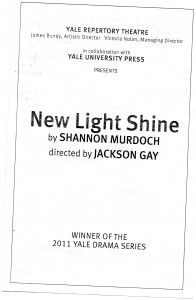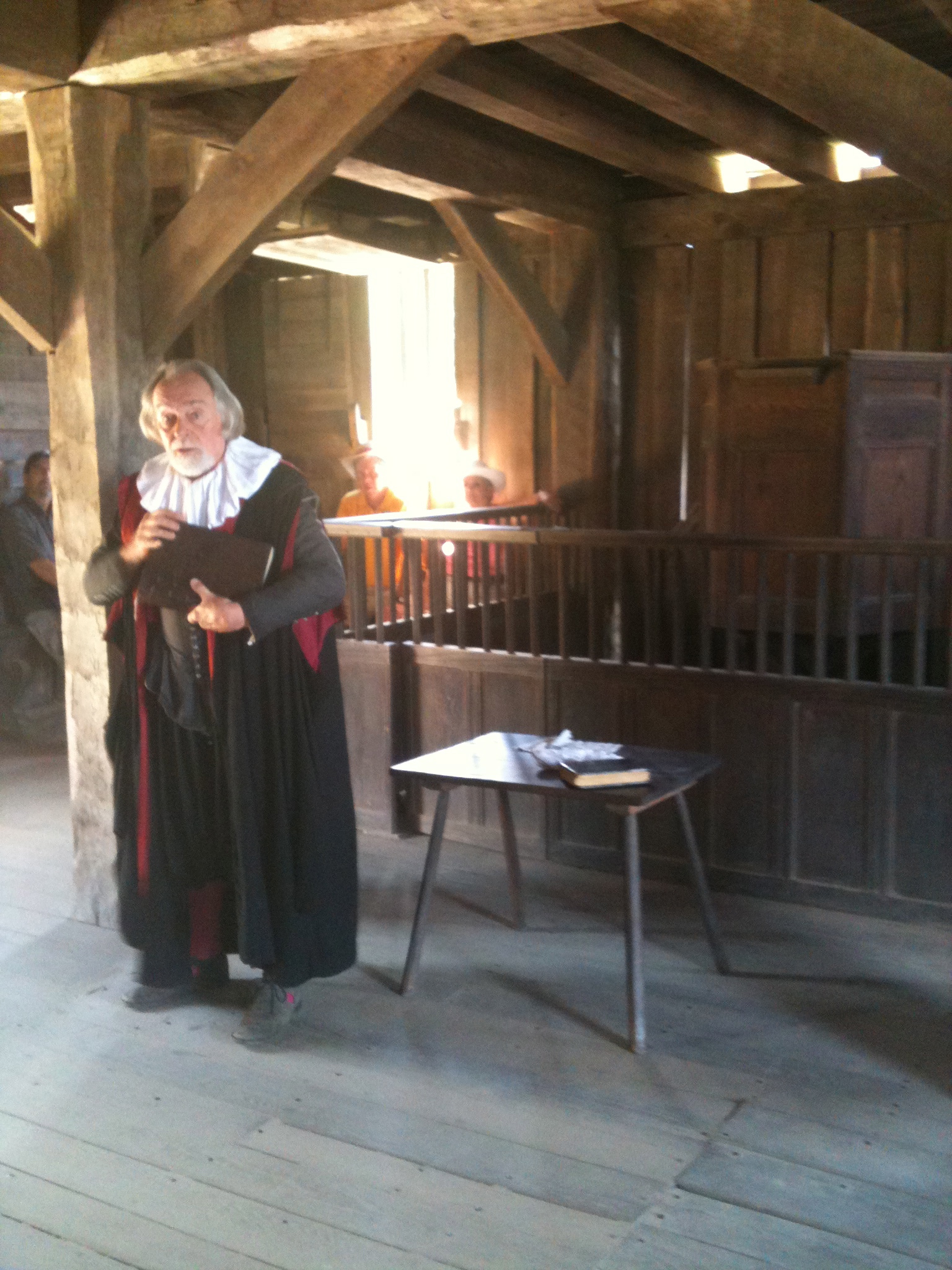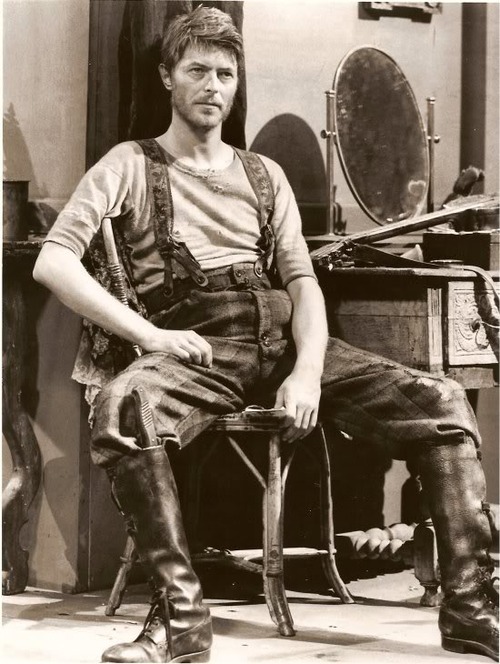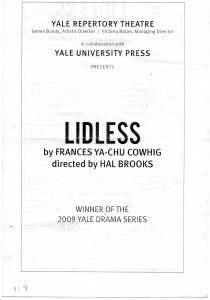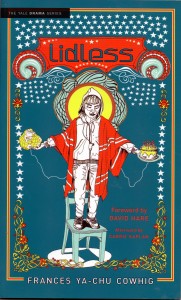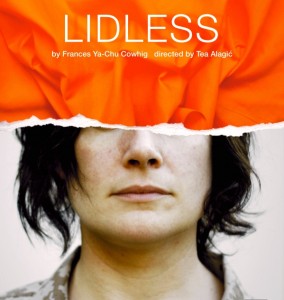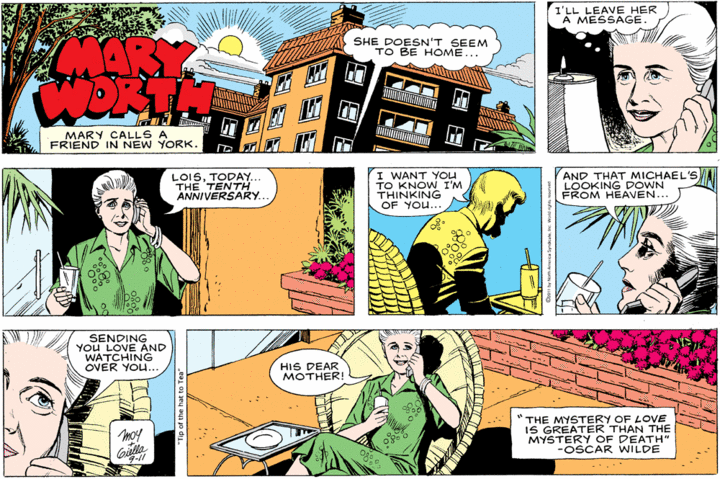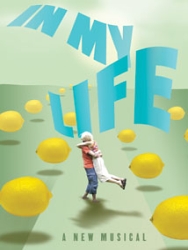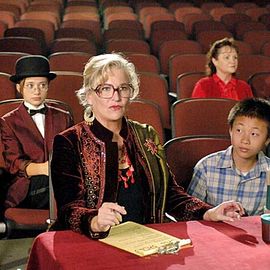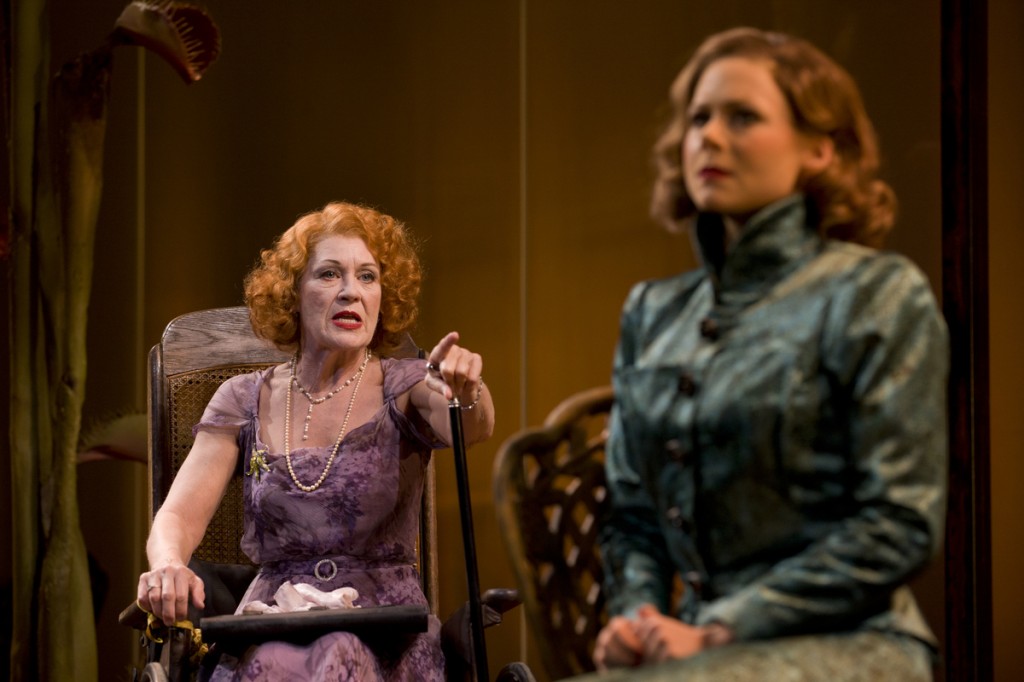
Annalee Jefferies and Liv Rooth in the Westport Country Playhouse production of Suddenly Last Summer. Photo by T. Charles Erickson.
Suddenly Last Summer
By Tennessee Williams. Through Sept. 10 at Westport Country Playhouse. Directed by David Kennedy. Scenic design by Narelle Sissons. Costume design: Ilona Somogyi. Lighting design: Matthew Richards. Original music/Sound design: Fitz Patton. Performed by Liv Rooth (Catharine Holly), Annalee Jefferies (Mrs. Venable), Lee Aaron Rosen (Dr. Cukrowicz), Charlotte Maier (Mrs. Holly), Ryan Garbayo (George Holly), Tina Stafford (Sister Felicity), Susan Bennett (Miss Foxhill).
What must it have been like to have seen the world premiere of Suddenly Last Summer in 1958? In winter? When it was half of a double bill with the collective title Garden District? (Its companion piece was Something Unspoken.) Before it was expanded (with the help of Gore Vidal) into a feature film? Before its title gained the comma after the “Suddenly”?
Suddenly Last Summer has become a play without an awful lot of baggage, some of it necessary in order to buttress a play that’s essentially a build-up to an extraordinary monologue.
At this point in his career, Tennessee Williams had turned out numerous equally fine, and similiarly structured, monologues, and would go on to write many more. What gives the fragile Suddenly Last Summer the cachet it has, next to the playwright’s long list of equally strong Southern-frenzy family psychodramas?
Well, it’s that ending, of course. An image so horrific that the characters onstage don’t want to consider it, but which somehow the audience accepts. Williams always knew just how far he could push a dirty little secret, how far he could pull in an audience without grossing them out.
Is there a literary term for a metaphor which is much more disturbing than the thing it is metaphorizing? Suddenly Last Summer is a simple, direct drama about a society which is unable to let itself accept certain things, a society which will race toward death and destruction before it will pause to accept certain differences in class, in character, in style, in preferences. In taste. If you don’t get the undercurrent of the seaside plot, there’s an onstage icon to concentrate on: a ten-foot Venus Flytrap plant, starving for sustenance.
The even toothier anecdotal image which climaxes the drama after the grandest build-up allowed onstage short of a three-ring circus. The entire play is a lead-in to the massive cathartic confessional monologue by Catharine Holly, a woman who must speak truth to power. She knows how her cousin Sebastian Venable—noted poet with an interest in, ahem, sea turtles—met his untimely death. Sebastian’s mother doesn’t want to hear Catharine’s scandalous, and possibly preposterous, ravings. Unless a lid can be clamped on Catharine, Mrs. Venable’s threatening to hold up the money which Sebastian willed to Catharine (and to her mother and brother, also present in the play, to simper and beg while Catharine tries to hold her ground and her sanity).
The human element is wonderfully manic. People blurt out things, then get cagey. They rant, then shut up politely so that others might rant too. They’re controlling, then strangely permissive. This seems natural after a while. What’s unarguably contrived, especially half a century after the play was written, is the medical certainty guiding the choice about what to do with Catharine. If she is given a lobotomy, nobody will ever believe her story. If she is given a certain truth serum, people undoubtedly will.
The Greeks had their theatrical devices too, and Suddenly Last Summer is no less tragic for having to stoop to that old “truth serum” gambit. Such surety about miracle cures and human behavior gives the already shadowy and sultry Suddenly Last Summer the air of film noir. Director David Kennedy and his designers take this realization and run with it. Costume designer Ilona Somogyi dresses the men in blindingly white suits to contrast with the darkness of Matthew Richards’ lighting. Set designer Narelle Sissons confines the players within a not exactly naturalism yet not exactly expressionistic boxy stage area. It’s sound designer Fitz Patton (whose work as a Yale School of Drama student a decade ago I still vividly recall—he did a similarly haunting design for a production of Caryl Churchill’s The Skriker) who gets to play the nature card, and who gets to most fully evoke the windswept beach which is the key location of Catharine’s story.
Some difficult choices have to be made here: how much should the designers choose to illustrate Catharine’s tale? How much should they underscore her emotional unrest with swelling music and erratic lighting? How still, or how out of control, should Catharine be when telling her story? How should her audience—the blistering Mrs. Venable, her secretary, Catharine’s dopey brother and weepy mom, a nurse and an earnest young doctor—behave when hearing it?
When Suddenly Last Summer became a movie, the filmmakers simply brought Catharine’s tale to life. The theatrical vision is far different. Kennedy and the rest of the creative team do a tricky balancing job between giving this show the tight, painterly composition it asks for and letting it breathe like it should.
Annalee Jefferies, one of Connecticut’s best-known Tennessee Williams interpreters thanks to her leading roles in several installments of the decade-long Williams “marathon” at Hartford Stage, nails the insufferability and vindictive vulnerability of Mrs. Venable, a character who seems to miss her long-gone youth more than she does her dead son. Jefferies, who’s only 57 years old herself, makes Mrs. Venable look and seem ghoulishly old and crusty. It’s impossible to think that this same actress was being Blanche Dubois just 13 years go, not to mention the frilly heroine of Theresa Rebeck’s comedy Bad Dates at Hartford Stage much more recently. How did this vibrant, rosy-faced actress learn to sit still in a wheelchair and connive so convincingly?
In the crucial role of Catharine, Liv Rooth lives up to the immense introduction she’s afforded from all those folks worrying about what she might say or do. She’s like one of the figurines in The Glass Menagerie: beautiful but close to cracking, and about to be stored away for her own good.
The supporting cast, to their credit, grandstands when necessary and fades into the background otherwise. I found myself wondering, if Tennessee Williams were writing today, whether he’d go to the unnecessary expense of trotting on Catharine’s family members—until I realized that they are much-needed comic relief. Charlotte Maier and Ryan Garbayo gamely inject the jokes, before Catharine gets injected with a needle. As a caretaking nun (Tina Stafford, who could give those dictatorial Late Nite Catechism nuns a run for their rosaries) and the secretary are critical characters as well, as representative of the order of things and higher powers as is that galumphing Venus Flytrap in the corner.
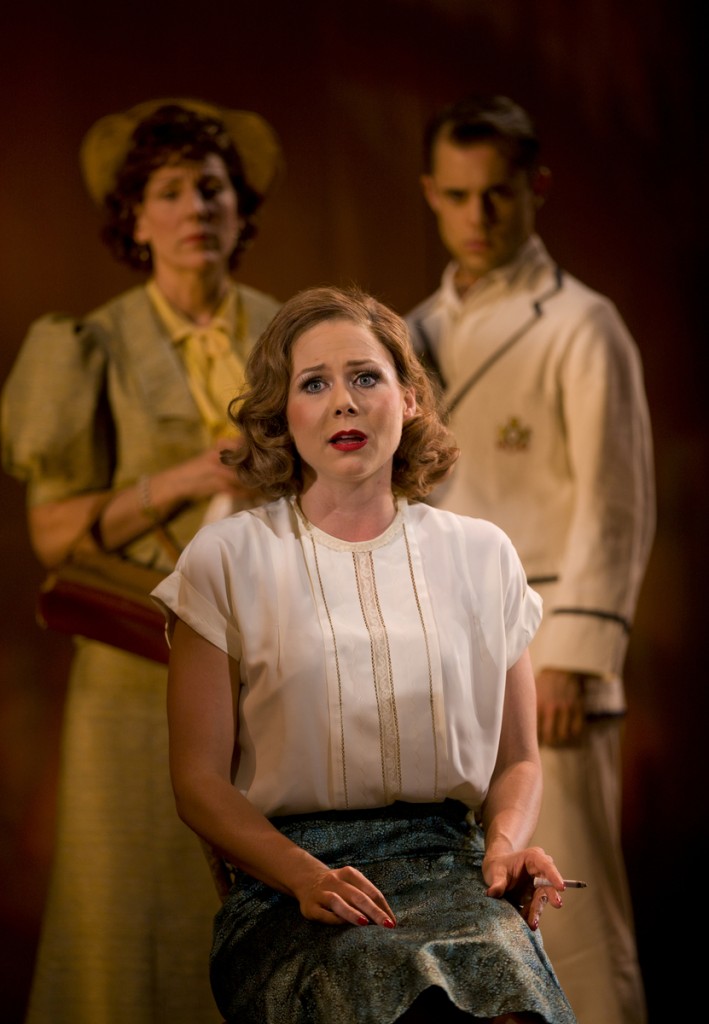
Liv Rooth as Catharine Holly, backed by Charlotte Maier as her mother and Ryan Garayo as her brother, in Suddenly Last Summer at Westport Country Playhouse. Photo by T. Charles Erickson.
Suddenly Last Summer is not an ensemble piece. It’s a series of solo turns with a virtuoso piece at the end.
Again, I can’t imagine what it must have been like to have seen Suddenly Last Summer as part of a bill, whether with Something Unspoken or anything else. But seeing it in this composed, modernistic, technically pristine yet lived-in production, I see how flexible and wondrous a script it is. It may be hard to swallow, but it goes down easy.

